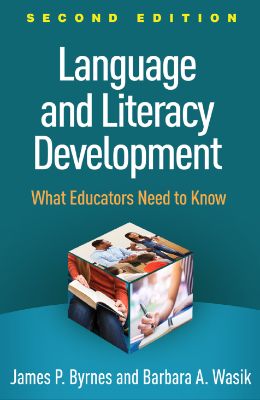Language and Literacy Development

Námskeið
- MLF1510160 Mál og læsi, fyrstu skrefin
Lýsing:
This established text--now revised and updated--reveals how spoken language skills are acquired and how they affect children’s later reading and writing achievement. With a unique focus on the needs of educators, the book examines the foundations of language in the developing brain. It explores the relationship of language processes to core literacy skills and probes the impact of motivational and sociocultural factors on children’s learning.
Implications of developmental knowledge for classroom instruction are highlighted, and effective practices reviewed. Revealing vignettes, clear explanations of research, and lists of “main ideas” enhance the text’s accessibility for preservice teachers. New to This Edition *Chapter on emergent literacy and the predictors of reading success. *Incorporates the latest research, including findings from key longitudinal studies.
Annað
- Höfundar: James P. Byrnes, Barbara A. Wasik
- Útgáfa:2
- Útgáfudagur: 2019-07-09
- Hægt að prenta út 30 bls.
- Hægt að afrita 2 bls.
- Format:ePub
- ISBN 13: 9781462540099
- Print ISBN: 9781462540044
- ISBN 10: 1462540090
Efnisyfirlit
- Cover
- Also from James P. Byrnes
- Title Page
- Copyright Page
- Dedication
- About the Authors
- Preface
- Contents
- PART I. Introductory Issues
- 1. Introduction
- Overview of Topics
- The General Approach of This Book
- 2. Brain Development, Language, and Literacy
- Why Study Brain Development?
- The Goal of Brain Development
- Further Explorations of Cytoarchitecture: Cell Types and Brain Layers
- Seven Major Processes of Brain Development
- Factors Affecting Brain Development
- Conclusions and Caveats
- 1. Introduction
- 3. An Overview of Spoken Language Competence
- The “Nature of” Question: What Does It Mean to Say That a Child Has Spoken Language Competence?
- The Relevance Question: Why Should Teachers Care about Whether Children Acquire Spoken Language Competence?
- The Developmental Trends Question: How Does Spoken Language Competence Change over Time?
- The Developmental Mechanisms Question: What Factors Promote Changes in Spoken Language Competence?
- The Deficiencies Question: Are There Populations of Children or Adults Who Lack Some or All of the Key Skills of Spoken Language Competence? Do These Individuals Experience Problems When They Learn to Read or after They Have Learned to Read?
- 4. The Development of Phonological Skills
- The “Nature of” Question: What Does It Mean to Say That a Child Has Phonological Processing Competence?
- The Relevance Question: Why Should Teachers Care about Whether Children Acquire Phonological Processing Competence?
- The Developmental Trends Question: How Does Phonological Processing Competence Change over Time?
- The Developmental Mechanisms Question: What Factors Promote Changes in Phonological Processing Competence?
- The Deficiencies Question: Are There Populations of Children or Adults Who Lack Some or All of the Key Skills of Phonological Processing Competence? Do These Individuals Experience Problems When They Learn to Read or after They Have Learned to Read?
- 5. The Development of Word Meaning and Vocabulary
- The “Nature of” Question: What Does It Mean to Say That a Child Knows the Meaning of Words?
- The Relevance Question: Why Should Teachers Care about Whether Children Know the Meaning of a Large Number of Words?
- The Developmental Trends Question: How Does a Child’s Spoken Vocabulary Change over Time?
- The Developmental Mechanisms Question: What Factors Promote Changes in Children’s Spoken Vocabulary?
- The Deficiencies Question: Are There Populations of Children or Adults Who Have Underdeveloped or Impaired Spoken Vocabularies? Do These Individuals Experience Problems When They Learn to Read or after They Have Learned to Read?
- 6. The Development of Grammatical Knowledge
- The “Nature of” Question: What Does It Mean to Say That a Child Has Grammatical Knowledge?
- The Relevance Question: Why Should Teachers Care about Whether Children Ever Acquire Grammatical Knowledge?
- The Developmental Trends Question: How Does a Child’s Grammatical Knowledge Change over Time?
- The Developmental Mechanisms Question: What Factors Promote Changes in Children’s Grammatical Knowledge?
- The Deficiencies Question: Are There Populations of Children or Adults Who Have Underdeveloped or Impaired Grammatical Knowledge? Do These Individuals Experience Problems When They Learn to Read or after They Have Learned to Read?
- 7. Emergent Literacy and Predictors of Early Reading Success
- Emergent Literacy
- Preliminary Issues
- Identifying and Rank Ordering Predictors of Reading Success
- Understanding Differences in Predictive Power
- Reasons for Caution in Interpreting Bivariate Correlations
- 8. Beginning Reading
- The “Nature of” Question: What Does It Mean to Say That a Child Has Beginning Reading Skills?
- Two Influential Models of Reading
- The Relevance Question: Why Should Teachers Care about Whether Children Acquire Beginning Reading Skills?
- The Developmental Trends Question: How Do Beginning Reading Skills Change over Time?
- The Developmental Mechanisms Question: What Factors Promote Changes in Beginning Reading Skills?
- The Deficiencies Question: Are There Populations of Children or Adults Who Lack Some or All of the Beginning Reading Skills? Do These Individuals Experience Problems When They Learn to Read or after They Have Learned to Read?
- 9. The Development of Reading Comprehension
- The “Nature of” Question: What Does It Mean to Say That a Child Has Reading Comprehension Skills?
- The Relevance Question: Why Should Teachers Care about Whether Children Acquire Reading Comprehension Skills?
- The Developmental Trends Question: How Do Reading Comprehension Skills Change over Time?
- The Developmental Mechanisms Question: What Factors Promote Changes in Reading Comprehension Skills?
- The Deficiencies Question: Are There Populations of Children or Adults Who Lack Some or All Reading Comprehension Skills? Do These Individuals Experience Problems When They Learn to Read or after They Have Learned to Read?
- 10. The Development of Writing Skills
- The “Nature of” Question: What Does It Mean to Say That Someone Has Writing Competence?
- The Relevance Question: Why Should Teachers Care about Whether Children Acquire Writing Skills?
- The Developmental Trends Question: How Do Writing Skills Change over Time?
- The Developmental Mechanisms Question: What Factors Promote Changes in Writing Skills?
- The Deficiencies Question: Are There Populations of Children or Adults Who Lack Some or All Writing Skills? Do These Individuals Experience Problems When They Learn to Write or after They Have Learned to Write?
- 11. Motivational Issues in Speaking, Reading, and Writing
- An Opportunity–Propensity (O–P) Model of Student Achievement
- The Nature of Motivation
- The Development of Motivation
- Individual Differences in Motivation
- Instructional Implications
- 12. Sociocultural Issues in Speaking, Reading, and Writing
- The Role of Gender in Language and Literacy Skill Acquisition
- The Role of SES in Language and Literacy Skill Acquisition
- The Role of Ethnicity in Language and Literacy Skill Acquisition
- The Role of Home Language in Language and Literacy Skill Acquisition
- The Role of Dialect in Language and Literacy Skill Acquisition
- Conclusions
- 13. General Principles of Effective Instruction
- Effective Teachers Are Skilled Decision Makers in the Classroom
- Domain-General Principles of Effective Instruction Based on Cognitive Theories
- Domain-General Principles Derived from Observational Measures
- Summary: Identifying Effective Approaches
- 14. Language and Literacy Programs That Work
- Interventions That Develop Emergent Literacy Skills
- Interventions That Develop Reading Skills
- Interventions That Develop Comprehension Skills
- Final Thoughts
UM RAFBÆKUR Á HEIMKAUP.IS
Bókahillan þín er þitt svæði og þar eru bækurnar þínar geymdar. Þú kemst í bókahilluna þína hvar og hvenær sem er í tölvu eða snjalltæki. Einfalt og þægilegt!Rafbók til eignar
Rafbók til eignar þarf að hlaða niður á þau tæki sem þú vilt nota innan eins árs frá því bókin er keypt.
Þú kemst í bækurnar hvar sem er
Þú getur nálgast allar raf(skóla)bækurnar þínar á einu augabragði, hvar og hvenær sem er í bókahillunni þinni. Engin taska, enginn kyndill og ekkert vesen (hvað þá yfirvigt).
Auðvelt að fletta og leita
Þú getur flakkað milli síðna og kafla eins og þér hentar best og farið beint í ákveðna kafla úr efnisyfirlitinu. Í leitinni finnur þú orð, kafla eða síður í einum smelli.
Glósur og yfirstrikanir
Þú getur auðkennt textabrot með mismunandi litum og skrifað glósur að vild í rafbókina. Þú getur jafnvel séð glósur og yfirstrikanir hjá bekkjarsystkinum og kennara ef þeir leyfa það. Allt á einum stað.
Hvað viltu sjá? / Þú ræður hvernig síðan lítur út
Þú lagar síðuna að þínum þörfum. Stækkaðu eða minnkaðu myndir og texta með multi-level zoom til að sjá síðuna eins og þér hentar best í þínu námi.
Fleiri góðir kostir
- Þú getur prentað síður úr bókinni (innan þeirra marka sem útgefandinn setur)
- Möguleiki á tengingu við annað stafrænt og gagnvirkt efni, svo sem myndbönd eða spurningar úr efninu
- Auðvelt að afrita og líma efni/texta fyrir t.d. heimaverkefni eða ritgerðir
- Styður tækni sem hjálpar nemendum með sjón- eða heyrnarskerðingu
- Gerð : 208
- Höfundur : 8691
- Útgáfuár : 2019
- Leyfi : 380


